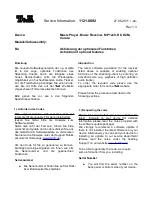
7
3. A
UDIO
O
UTPUT
The MT1379 supports two-channel and six-channel analog audio output. In a system
configuration with six analog outputs, the front left and right channels can be configured to
provide the stereo (2 channel) outputs and Dolby Surround, or the left and right front channels for
a 5.1 channel surround system.
The MT1379 also provides digital output in S/PDIF format. The board supports both optical and
coaxial SPDIF outputs.
4. A
UDIO
DAC
S
The MT1379 supports several variations of an I
2
S type bus, varying the order of the data bits
(leading or no leading zero bit, left or right alignment within frame, and MSB or LSB first) is
possible using the MT1379 internal configuration registers. The I
2
S format uses four stereo data
lines and three clock lines. The I
2
S data and clock lines can be connected directly to one or more
audio DAC to generate analog audio output.
The two-channel DAC is an AKM AK4382A. The DACs support up to 192kHz sampling rate.
The outputs of the DACs are differential, not single ended so a buffering circuit is required. The
buffer circuits use National LM833 op-amps to perform the low-pass filtering and the buffering.
5 .V
IDEO
I
NTERFACE
5.1 Video Display Output
The video output section controls the transfer of video frames stored in memory to the internal TV
encoder of the MT1379. The output section consists of a programmable CRT controller capable
of operating either in Master or Slave mode.
The video output section features internal line buffers which allow the outgoing luminance and
chrominance data to match the internal clock rates with external pixel clock rates, easily
facilitating YUV4: 2:2 to YUV4: 2:0 component and sample conversion. A polyphase filter
achieves arbitrary horizontal decimation and interpolation.
Video Bus
The video bus has 8 YUV data pins that transfer luminance and chrominance (YUV) pixels in
CCIR601 pixel format (4:2:2). In this format, there are half as many chrominance (U or V) pixels
per line as luminance (Y) pixels; there are as many chrominance lines as luminance.
Video Post-Processing
The MT1379 video post-processing circuitry provides support for the color conversion, scaling,
and filtering functions through a combination of special hardware and software. Horizontal up-
sampling and filtering is done with a programmable, 7-tap polyphase filter bank for accurate
non-integer interpolations. Vertical scaling is achieved by repeating and dropping lines in
accordance with the applicable scaling ratio.
Video Timing
The video bus can be clocked either by double pixel clock and clock qualifier or by a single pixel
clock. The double clock typically is used for TV displays, the single for computer displays.
Содержание DVD5500
Страница 1: ...DVD5500 DVD PLAYER SERVICE MANUAL ...
Страница 14: ...14 13 CIRCUIT SCHEMATICS Appendix A ...
































